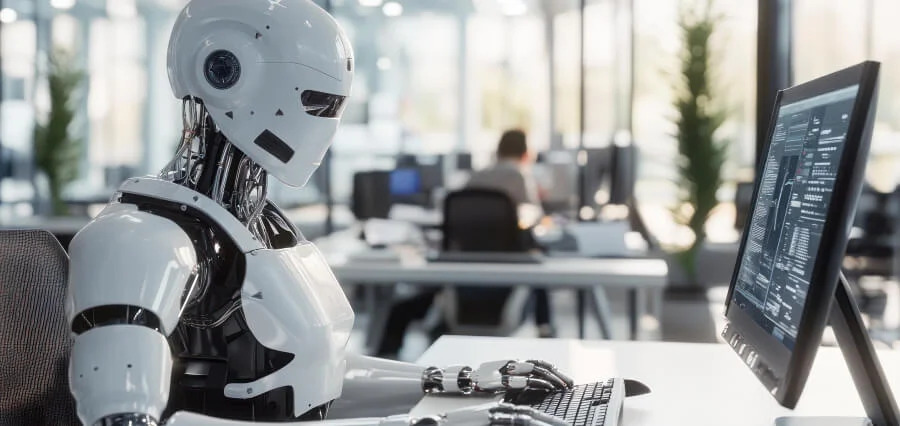The Security Outlook: AI is Powerful but Not a Job Killer in Key Fields, Says Bill Gates
 Abhi Nale
Abhi Nale
The Security Outlook explores Bill Gates’ perspective on the growing influence of artificial intelligence (AI) and its impact on employment across key industries. While AI is undeniably transforming various sectors, Gates reassures that it is not a threat to job security but rather a tool for enhancing productivity and efficiency.
The Role of AI in Modern Industries
Artificial intelligence has made significant strides in recent years, influencing sectors such as healthcare, education, finance, and cybersecurity. The Security Outlook highlights that AI’s capabilities extend beyond automation, providing support in decision-making, risk assessment, and operational efficiency.
1. AI in Healthcare: Aiding, Not Replacing Professionals
One of the most promising applications of AI is in the healthcare industry. AI-powered tools assist doctors in diagnosing diseases, personalizing treatment plans, and analyzing medical data. The Security Outlook emphasizes that AI enhances medical professionals’ capabilities rather than replacing them, ensuring more accurate and timely healthcare solutions.
2. AI in Cybersecurity: Strengthening Digital Protection
With the increasing number of cyber threats, AI has become a crucial asset in cybersecurity. AI-driven algorithms detect anomalies, predict security breaches, and respond to cyberattacks in real time. The Security Outlook notes that AI improves threat detection and mitigation strategies, making cybersecurity teams more efficient in safeguarding data and systems.
3. AI in Education: Supporting Educators
In the education sector, AI is revolutionizing learning experiences through personalized teaching methods and automated grading systems. The Security Outlook explains that AI allows educators to focus on interactive and creative teaching approaches while AI handles administrative tasks, benefiting both teachers and students.
4. AI in Finance: Enhancing Decision-Making
Financial institutions leverage AI for fraud detection, market analysis, and customer service automation. AI-powered chatbots assist customers, while predictive analytics help in making informed investment decisions. The Security Outlook highlights that AI-driven financial tools provide greater efficiency without eliminating the need for human expertise.
Bill Gates’ Perspective on AI and Employment
1. AI as a Productivity Booster
According to Gates, AI’s primary function is to enhance productivity rather than eliminate jobs. The Security Outlook reports that AI allows professionals to focus on complex and creative tasks while automating repetitive processes. This shift leads to more efficient workflows and better resource allocation.
2. New Job Opportunities in AI-Driven Industries
While some traditional roles may evolve, AI is creating new job opportunities in AI development, data analysis, and machine learning. The Security Outlook emphasizes that industries will require skilled professionals to manage, maintain, and innovate AI technologies, leading to increased employment opportunities.
3. Human-AI Collaboration: The Future of Work
Rather than replacing human workers, AI is becoming a collaborative partner. The Security Outlook states that AI assists professionals in making better decisions, analyzing vast amounts of data, and automating tedious tasks. This collaboration fosters innovation and enhances workforce capabilities.
4. Addressing Ethical and Bias Concerns
Gates acknowledges concerns regarding AI ethics and potential biases in decision-making algorithms. The Security Outlook highlights the importance of regulatory frameworks and ethical AI development to ensure fair and unbiased technology deployment across industries.
The Future of AI and Workforce Adaptation
As AI continues to evolve, industries must adapt by investing in upskilling and reskilling their workforce. The Security Outlook suggests that educational institutions and businesses should collaborate to equip professionals with AI-related skills, ensuring a seamless transition into an AI-driven economy.
1. Encouraging Lifelong Learning
To remain competitive, employees should embrace lifelong learning and continuous skill development. The Security Outlook recommends online courses, certifications, and AI workshops to enhance technical knowledge and adaptability.
2. Developing AI Governance Policies
Governments and organizations must establish AI governance policies to regulate its ethical use. The Security Outlook underscores the need for transparency, accountability, and responsible AI deployment to prevent misuse and bias.
3. Emphasizing Human Creativity and Emotional Intelligence
AI lacks human creativity, emotional intelligence, and critical thinking skills. The Security Outlook highlights that professionals should focus on strengthening these uniquely human attributes, ensuring their continued relevance in an AI-powered workplace.
Conclusion
Artificial intelligence is transforming industries, but it is not a job killer. Instead, it enhances efficiency, fosters collaboration, and creates new employment opportunities. The Security Outlook aligns with Bill Gates’ perspective that AI should be embraced as a tool for progress rather than a threat to job security. By adapting to AI advancements, upskilling the workforce, and implementing ethical AI governance, industries can harness AI’s potential while ensuring a balanced and sustainable future.
Subscribe to my newsletter
Read articles from Abhi Nale directly inside your inbox. Subscribe to the newsletter, and don't miss out.
Written by
